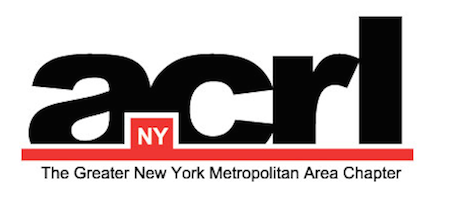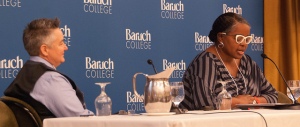By Albert Tablante
The 2015 ACRL/NY symposium began with a progressive talk from Chris Bourg, the Director of MIT Libraries, and Lareese Hall, the Architecture and Art Librarian for the MIT Libraries. The discourse builds on the premise that radical changes within academic librarianship have developed in recent years. The presenters acknowledge that this type of activism in academic libraries has been grass-roots in that few library directors are taking on reformist agendas. In their presentation, Chris and Lareese shared their perspectives on the challenges and opportunities that arise when a “new director of a research library arrives with an explicit social justice agenda, grounded in queer and feminist theory and politics.”
Chris and Lareese began the discourse by introducing the format of their talk. It was going to be a conversation as opposed to a couple of traditional symposium speeches. The result was spontaneous, innovative, and exciting. Lareese stated in her opening statement that she doesn’t want to say anything “tweetable” and that she just wanted people to engage and listen. Nonetheless, tweets were posted and what transpired was worthy of quoting.
After the opening remarks, the presenters took turns asking each other questions. The first question Lareese asked Chris, “How does a queer and feminist agenda become activated within an academic and hierarchical library organization?” In her response, Chris stated that it is difficult to answer because there is no realized example of this sort of agenda in academic libraries. She does say that the library should reflect the diversity of the communities they serve. “The staff and patrons should be empowered and policies are transparent and inclusive.” Some of her initiatives at MIT Libraries include: “no unpaid interns, including support staff in leadership council meetings, retreats and search committees.”
Some “tweetable” soundbites from Lareese include her stating that her agenda is “subversive, rebellious; and is one that seeks to establish a critical consciousness about the existence and importance of art, design and creative thinking.” She later spoke about feminist leadership, saying that leadership should “create opportunities for dissecting, rethinking and rebuilding the society, profession, and organization.” This touches on the theme of radicalism coming from inside the library. Many of the changes in academic librarianship are coming from the proactive librarians, not necessarily from institutional administration.
After answering each other’s questions, a Q & A session was open to the floor. It was a strong opening presentation for the ACRL/NY 2015 Symposium: Social Responsibility, Democracy, Education, and Professionalism: Supporting Core Values in Academic and Research Librarianship.
Albert Tablante is Information Literacy Instructor at ASA College Library
in Brooklyn, New York. He may be contacted at ATablante@asa.edu.

